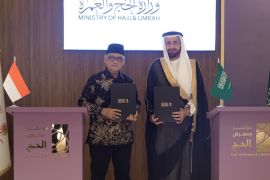The use of this technology will help the search for lost pilgrims, Coordinating Minister for Human Development and Culture Muhadjir Effendy said.
"I think that this has to be done soon. This has to be implemented as quickly as possible," he remarked while visiting Indonesian Hajj Health Clinic (KKHI) here on Saturday.
Effendy highlighted the importance of hajj service innovation based on IT, identification, safety and security of pilgrims during hajj pilgrimage.
The implementation of the technology is expected to improve service quality, identify the basic needs of elderly pilgrims and untangle annual hajj problems such as pilgrims being separated from their group.
According to the minister, services for this year's hajj pilgrimage has improved with the formation of integrated command posts similar to the ones used to handle the Eid al-Fitr homecoming.
"In the posts there are personnel of TNI (National Defense Force) and Polri (National Police), health workers, guides from the Ministry of Religious Affairs, reporters. This is important," he said.
For this year and the previous years, Indonesian hajj pilgrims have worn a metal bracelet engraved with Latin and Arabic letters which contains several information.
These include name, passport identity number, point of departure and pilgrims' maktab number.
In addition to bracelet, Indonesian hajj pilgrims are also complemented with a red and white card which contains a barcode that can be scanned with Haji Pintar application.
The barcode contains pilgrims' full name, origin, hotel name and sector.
Related news: President urges pilgrims to perform Hajj properly
Related news: Indonesia prepares officers to assist elderly pilgrims during Hajj
Related news: Indonesia to prioritize elderly pilgrims during 2023 Hajj season
Translator: Nur Istibsaroh, Fadhli Ruhman
Editor: Sri Haryati
Copyright © ANTARA 2023












